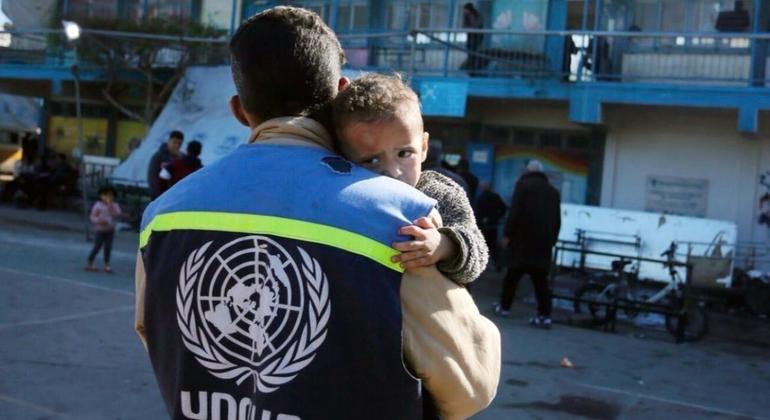The World Food Programme (WFP) successfully delivered enough food for 25,000 people to Gaza City in a convoy on Tuesday, marking the first successful delivery to the north since February 20. The UN agency emphasized the urgent need for daily deliveries and direct entry points into northern Gaza, where people are on the brink of famine. Additionally, an aid ship called Open Arms left Cyprus for Gaza carrying 200 tonnes of relief supplies, but UN humanitarians stressed that this maritime assistance is not a substitute for overland aid to Gaza. They highlighted the importance of overland transport for delivering food and emergency aid, particularly to northern Gaza.
Jens Laerke, a spokesperson for the UN aid coordination office, expressed appreciation for any aid that comes into Gaza, but reiterated that it cannot replace overland transport of essential supplies. The UN’s Senior Humanitarian and Reconstruction Coordinator for Gaza, Sigrid Kaag, welcomed the new maritime corridor to Gaza as an additional means of aid delivery, emphasizing that land routes from Israel, Egypt, and Jordan are crucial for humanitarian efforts. The opening of the maritime corridor is part of a sustained humanitarian response to provide aid through all possible routes to address the dire situation in Gaza.
World Central Kitchen, the NGO behind the Open Arms initiative, has collaborated with UN aid teams in Rafah, southern Gaza, where 1.5 million people have sought shelter amid ongoing Israeli bombardment and fighting. UNRWA Commissioner-General Philippe Lazzarini condemned the refusal to allow “dual-use” items, such as children’s medical scissors, to enter Gaza. He highlighted that essential items, including anaesthetics, medical equipment, and lifesaving supplies, are classified as “dual use” by Israeli authorities, hindering humanitarian efforts in Gaza. Lazzarini emphasized the need for the facilitation and acceleration of humanitarian supply clearances to meet the needs of Gaza’s two million residents.
The UN continues to explore all available options to deliver aid to Gaza and address the escalating humanitarian crisis. The maritime corridor, while a welcome addition to aid delivery efforts, does not diminish the importance of overland transport routes for supplying essential goods to the region. Land routes from Israel, Egypt, and Jordan remain critical for the overall humanitarian response in Gaza. The UN and its partners are committed to providing aid as effectively as possible through multiple routes to reach those in need in Gaza.
In conclusion, the UN is working tirelessly to address the urgent humanitarian needs in Gaza, where people are facing extreme food insecurity and a lack of essential supplies. While the delivery of aid through the maritime corridor is a positive development, it is not a substitute for overland transport routes that are vital for delivering food and emergency assistance to Gaza, particularly to the northern region. The UN and its humanitarian partners are calling for the facilitation and acceleration of aid delivery to Gaza to prevent further suffering among the two million residents affected by the crisis.









